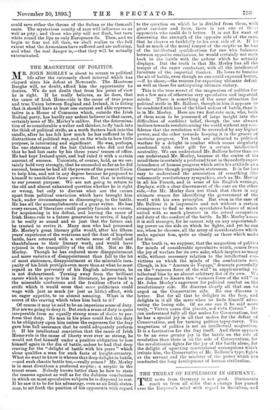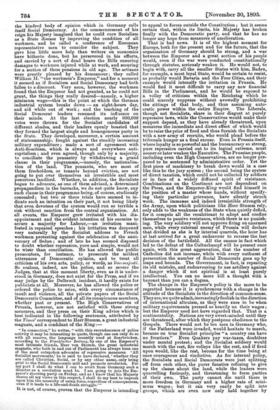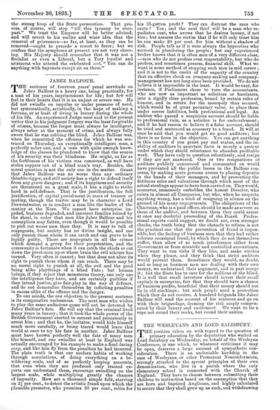THE THREAT OF REPRESSION IN GERMANY.
THE news from Germany is not good. Statements reach us from all sides that a change has passed over the Emperor's mind with regard to Socialism, and the kindred body of opinion which in Germany calls itself Social Democracy. At the commencement of his reign his Majesty imagined that he could cure Socialism as a State disease by improving the condition of all workmen, and he called a conference of European representative men to consider the subject. They gave him little more help than writers on economics have hitherto done, but he persevered in his efforts, and. carried by a sort of dead heave the Bills ensuring damages to workmen injured while at work, and securing for a section of them pensions in old age. The artisans were greatly pleased by his demeanour ; they called William II. "the workmen's Emperor," and for a moment it seemed as if Socialism and Social Democracy had. both fallen to a discount. Very soon, however, the workmen found that the Emperor had not granted, as he could not grant, the things they really desired—namely, a higher minimum wage—this is the point at which the German industrial system breaks down — an eight-hours day, and aid while out of work ; and the teaching of the Social Democrat leaders resumed its influence on their minds. At the last election nearly 600,000 votes were thrown for the Socialist candidates of different shades, and their leaders openly boasted that they formed the largest single and homogeneous party in the State. They developed, moreover, a certain amount of statesmanship; fought against the steadily increasing military expenditure ; made a sort of agreement with Anti-Semitism, which is always and everywhere anti- capitalism ; and even agreed, though only by a majority, to conciliate the peasantry by withdrawing a grand clause in their programme,—namely, the nationalisa- tion of the land. The peasants, who are most of them freeholders, or tenants beyond eviction, are not going to put over themselves an irresistible and most penurious landlord. Whether, in addition, the Socialists began to advocate, as one of them advised, a determined propagandism in the barracks, we do not quite know, any such clause in their programme being, of course, studiously concealed; but two or three trials have seemed to in- dicate such an intention on their part, it not being likely that even devotees of the system would. run so terrible a risk without sanction from the central organisation. At all events, the Emperor grew irritated with his dis- appointment and the evident intention of his enemies to secure a majority for Labour,—an irritation mani- fested in repeated speeches ; his irritation was deepened very naturally by the Socialist address to French workmen protesting against the celebration of the anni- versary of Sedan ; and of late he has seemed disposed to doubt whether repression, pure and simple, would not be wiser than conciliation. He has allowed the public prosecutors, for instance, to prosecute the mildest utterances of Democratic opinion, and to treat all criticism of his own acts, policy, or words, as lase-majest4. So zealous, indeed, are the police, and so severe the Judges, that at this moment liberty, even as it is under- stood in Germany, does not exist for the Press, and if we may judge by the Delbruck incident, it hardly exists for publicists at all. Moreover, he has allowed the police or ordered the police to seize, with every circumstance of insult and violence, all the private papers of the Social Democratic Committee, and of all its conspicuous members, whether past or present. The High Conservatives of Prussia, however, are not satisfied with these strong measures, and they press on their King advice which is best indicated in the following sentences, attributed by the Times' correspondent to Herr Stumm, a great industrial magnate, and a confidant of the King :— " In connection," he writes, "with this recrudescence of police activity it may be interesting to quote, though one can only do so with all reserve, the language recently used at Saarbriicken, according to the Frankfurter Zeitung, by one of the Emperor's most intimate friends, Herr von Stumm, the great industrial magnate, who both in and out of Parliament has always been one of the most outspoken advocates of repressive measures. 'All Socialist movements,' he is said to have declared, whether they are called Christian, Social, or by any other name, only bring grist to the Social Democratic mill and promote revolution. For my part I shall do what I can to avert from Germany such a disaster as a revolution must be. I am going to join the Em- peror's shooting party on Friday, and as I know that his Majesty shares all my views in this respect, I shall do my best to impress upon him the necessity of using force, regardless of consequences, even if it leads to a life-and-death struggle.'" It is not, of course, proven that the Emperor is intending to appeal to forces outside the Constitution ; but it seems certain that, within its limits, his Majesty has broken finally with the Democratic party, and that he has no longer any hope from measures of amelioration. That is bad news. It is of the highest moment for Europe, both for the present and for the future, that the organisation of Germany should be strong, and a war between the Emperor and a great section of his people would, even if the war were conducted constitutionally through statutes, seriously weaken it. He would not, to begin with, carry all the smaller States with him, Baden, for example, a most loyal State, would be certain to resist, as probably would Bavaria and the Free Cities, and their example would intensify the irritation in Prussia. He would find it most difficult to carry any new financial Bills in the Parliament, and he would be exposed to a volley of criticism within the Reichstag which he could scarcely suppress without avowedly prohibiting the sittings of that body, and thus assuming auto- cratic power within the entire Empire. The Liberals, though not Socialists, share in their disgust at purely repressive laws, while the Conservatives would make their support depend, as they have already threatened, upon measures the immediate and direct effect of which would be to raise the price of food and thus furnish the Socialists with a new army of recruits, who would plead before the tribunals hunger as a final excuse. Even in Prussia itself, where loyalty is so powerful and the bureaucracy so strong, pure repression carried out to its logical extreme, must sooner or later weaken the Executive. The Prussian people, including even the High Conservatives, are no longer pre- pared to be sentenced by administrative order. Yet the first piece of machinery to break down would in a case like this be the jury system ; the second being the system of direct taxation, which could not be collected. by soldiers or in face of a widely diffused spirit of resistance. Combinations on the Continent are not dependent on the Press, and the Emperor-King would find himself in the position of a master whose hands, without specify- ing their particular grievance, have silently struck work. The immense and indeed irresistible strength of the Army, upon which politicians like Herr Stumm rely, only adds to the weakness of the State when quietly defied, for it compels all the recalcitrant to adopt and. confine themselves to passive resistance, which there is no punish- ing. The very soldiery will not approve firing on unarmed. men, while every external enemy of Prussia will declare that divided as she is by internal quarrels, the hour has at last arrived for a great endeavour to reverse the last decision of the battlefield. All the causes in fact which led to the defeat of the Culturkampf will be present once again, with this great aggravation, that the number of Catholics did not increase, while with every outburst of persecution the number of Social Democrats goes up by leaps and bounds. The Government, in fact, is repeating its old mistake, and. endeavouring to use artillery against a danger which if not spiritual is at least purely intellectual. You can no more kill a thought with a bayonet than you can a dogma.
The change in the Emperor's policy is the more to be regretted because it is synchronous with a change in the attitude of the Socialists in the direction of common-sense. They are, we quite admit, increasingly foolish in the direction of international altruism, as they were sure to be when military requirements pressed so heavily on their wages ; but the Emperor need not have regarded that. That is a sentimentality. Nations are very sweet-minded until they are threatened, after which they postpone obedience to the Gospels. There would not be ten men in Germany who, if the Fatherland were invaded, would hesitate to march, because on true Socialist principles "a country can have no frontiers." Even Quakers pay war-taxes, doubtless under mental protest ; and the Socialist soldiery would march with the rest, fire volleys like the rest, and. if fired. upon would, like the rest, become for the time being at once courageous and vindictive. As for internal policy, the Socialists and Social Democrats were just splitting off from each other, the purer fanatics refusing to give up the clause about the land, while the leaders were quarrelling furiously, and threatening to form parties of their own. The party cannot die until there is more freedom in Germany and a higher rate of mini- mum wages ; but it can very easily be split into groups, which are even now only held together by the strong hoop of the State persecution. That pro- cess, of course, will stop "till this tyranny be over- past." We trust the Emperor will be better advised, and will revert to his earlier and. wiser idea that the removal of grievances—so far, at least, as they can be removed—ought to precede a resort to force; but we confess that the symptoms at present are not very cheer- ing. His Majesty should remember that it was not a Socialist or even a Liberal, but a Tory loyalist and aristocrat who uttered the celebrated mot, "You can do anything with bayonets except sit on them."












































 Previous page
Previous page